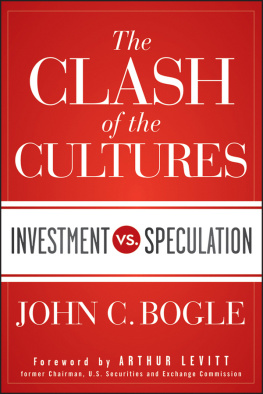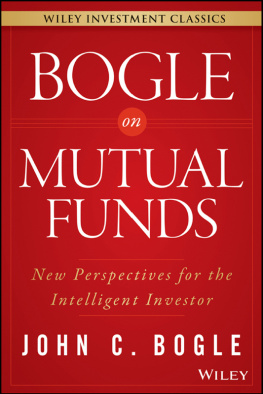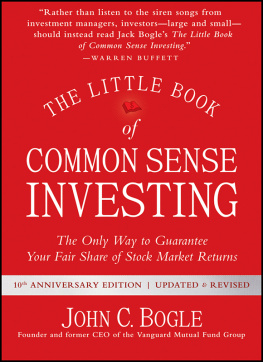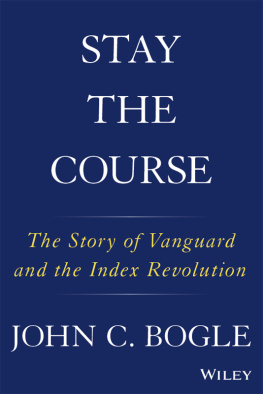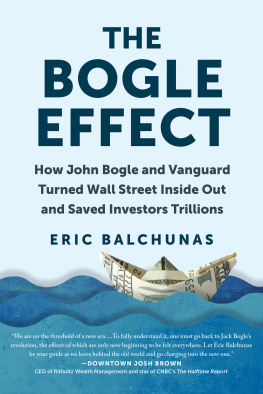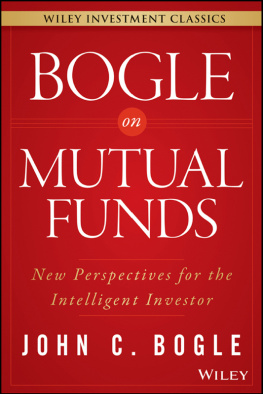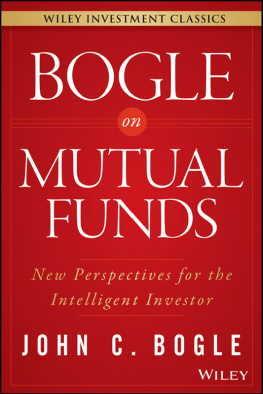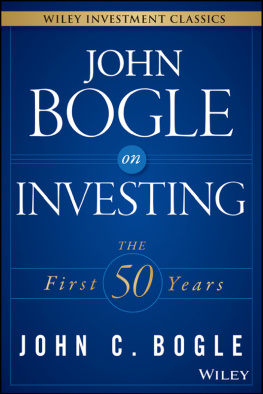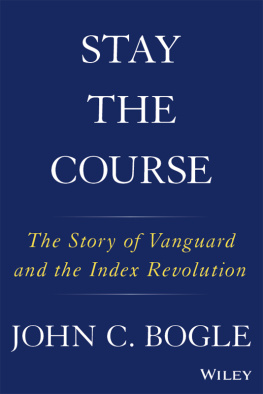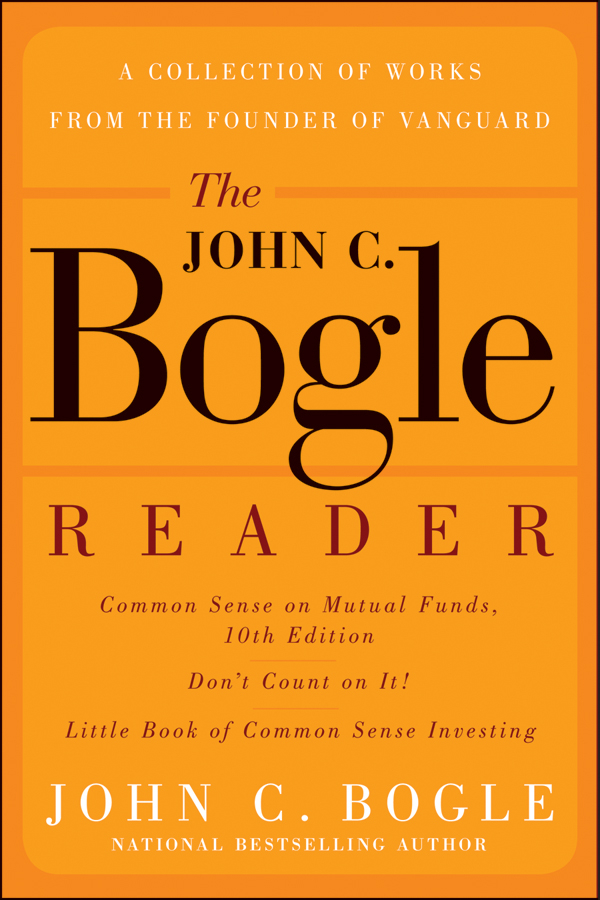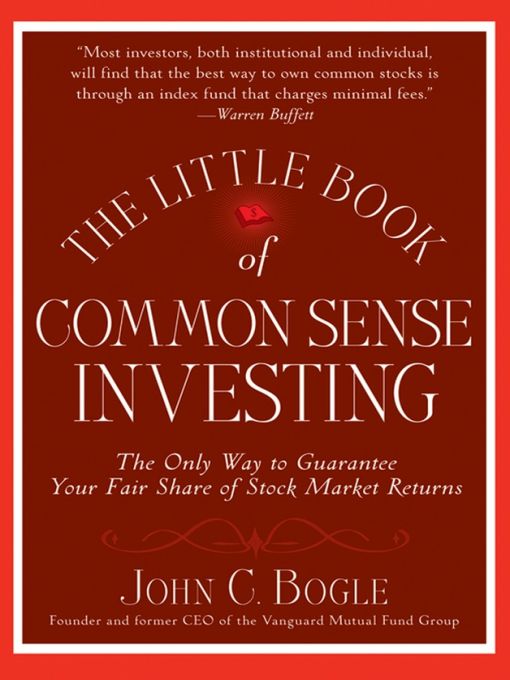Introduction
I have dedicated my longcareer to building a better financial world for investors. Whether it was creating the nation's only truly mutual mutual fund company or creatingthe index fund, I've done my utmost to keep the best interests of investors as my chief priority. I've now written 10 books covering a wide range of topics-attempts to help individual investors make sense of the financial markets, the creation of The Vanguard Group, the failures of our nation's financial system, and the wisdom of long-term investment and the folly of short-term speculation. But the theme of fiduciary duty to investors-the idea that the client's interests must always come first-has been at the heart of all of my books, and the three included in this e-Book bundle are no exception. Why bundle these three books together? The Little Book of Common Sense Investing provides a simple, straightforward approach to investing; Common Sense on Mutual Funds is more complex, but reinforces many of the same themes; and Don't Count on It! puts those themes in a broader context while giving the reader the ability to browse through a variety of speeches on different topics.
The Little Book of Common Sense Investing
We know that in every investment transaction, there is a winner and a loser.One party is (relatively) enriched, while the other is (relatively) impoverished.But the financial intermediaries in the middle-the croupiers, as it were-take their share of every trade.So, in aggregate, investing is a zero-sumgame before costs, but it is a loser's game after costs. The only way to guarantee your fair share of the market's return is to minimize costs and own the entire market, thereby diversifying away the risks associated with individual stocks, sectors, and styles.
Clearly, low-cost, broad-market index funds are the easiest and most efficient way to implement this strategy. They take full advantage of the magic of compounding returns by keeping intermediation costs at rock-bottom, thereby avoiding the tyranny of compounding costs. These ideas are at the heart of my 2007 book,The Little Book of Common Sense Investing.In it, I attempt to explain the workings of the financial system in a way that will transform how readers approach investing. Those investors who leave the financial casino and opt for broadly diversified, long-term, low-cost index funds are virtually guaranteed to receive their fair share of the market's returns.By minimizing the drag caused by unnecessary intermediation costs and diversifying away uncompensated risks, we allow the productive power of our nation's economy to work its magic in gradually building the intrinsic value of our investments.
Common Sense on Mutual Funds-Fully Updated 10thAnniversary Edition
The first edition of Common Sense on Mutual Funds was published in 1999.In that original book, my primary goal was to help readers become more successful investors. I'd like to think that I largely achieved that goal. The fundamentals of investing that I set forth have been confirmed-and then some. The keys to investment success that I outlined-focusing on low-cost, broadly diversified index funds as the core of your portfolio, making intelligent asset allocation decisions, keeping it simple, understanding that the intrinsic value of corporate business drives investment success over the long term-remain true today. Well into the future, these "relentless rules of humble arithmetic" are bound to hold true.
In this fully updated and revised edition of Common Sense on Mutual Funds, I had the audacity to leave the text of the original 1999 edition essentially untouched, and brought it up to date with refreshed data and additional commentary throughout. The rules I offered in the original had been surely reaffirmed, even though it was written near the stock market's high in 2000 and the new edition was penned shortly after the market's low in 2009. Assets managed by the mutual fund industry now exceed $12 trillion and the industry has become the dominant vehicle for individual investors and those saving for retirement. But the old rules of long-term prudent investing remain intact.
My secondarygoal was to make the mutual fund industry a better place for investors. Alas, that goalremains out of reach. We've seen marketing and salesmanship continue to dominate stewardship. We've seen fiduciary duty too often ignored.And our nation's corporate governance structure continues to serve the interests of corporate managers and investment managers, rather than investors.The rules for investment success remain clear, and I am confident that, in the long-run, the interests of investors will again be paramount. For, as Winston Churchill reminds us, Americans always do the right thing, "but only after they've tried everything else."
Don't Count on It!
As the fiduciary principles on which the mutual fund industry was founded have eroded, we moved from a professional culture focused on the interests of investors to a business culture in which the "bottom line" is all that matters. In today's bottom line society, too often we seek the wrong bottom line: money over achievement, form over substance, charisma over character, prestige over virtue, the ephemeral over the enduring. I explore these topics in my 2011 anthology Don't Count on It!I also explore the shortcomings of the mutual fund industry, the proven success of indexing, my views on entrepreneurship and idealism, and tributes to four of my personal heroes and mentors. The book is a collection of 35 speeches and essays that I've written over the years.While it may seem intimidating, the book gives browsers the ability to seek out those areas in which they have a particular interest.
Our society's focus on and trust in numbers, with little regard to how easy they are to manipulate, is a common theme throughout the book. Far too often, we focus on momentary, fleeting stock prices-which can be measured precisely-rather than durable, intrinsic value-which is as real as it is difficult to measure. I'm reminded of Einstein's observation that "Not everything that counts can be counted, and not everything that can be counted counts." I describe the catastrophic consequences that occur when we place too much emphasis on these illusory numbers and let ourselves be fooled into thinking that past market returns are prologue; that mutual funds, on average, can be above average; and that corporate financial reports actually represent economic reality.
Timeless Wisdom
The themes expressed in these three books are timeless. They were critical when I first wrote them, they are still critical today, and they will remain critical tomorrow and well into the future. The importance of observing fiduciary duty, putting the interests of clients first, and the fundamental soundness of indexing are the foundation upon which I've built my career. As Confucius said, "By three methods may we learn wisdom.First, by reflection, which is noblest; second, by imitation, which is easiest; and third, by experience, which is bitterest." Let us not forget the wisdom we have gained through the bitter experience of recent years, for only then can we set our financial system and our society in general on a path to continued prosperity.

Table of Contents
Little Book Big Profits


